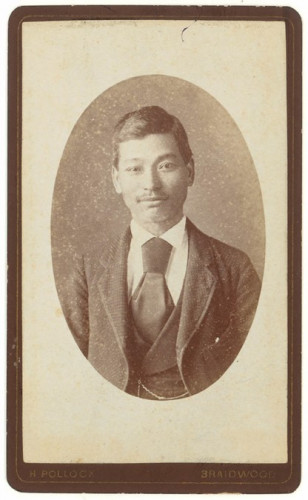South Coast NSW History Story
Mei Quong Tart
Mei Quong Tart was born in Canton, China, in 1850 and travelled to Australia when he was age 9 with his uncle who was escorting a shipload of coolies to the Araluen-Braidwood goldfields.
He was ‘adopted’ by a local Bells Creek couple, Robert Percy and Alice Simpson. From them he learned English and English ways, and they converted him to Christianity. They also encouraged him to acquire shares in local gold claims.
As a result, by 18 years of age he had become a wealthy man.
He acted as an interpreter for the significant community of Chinese miners in the Braidwood-Araluen area, was captain of the local cricket team, founded a local football team and promoted horse-racing. His activities and contacts ensured that the racism which was rife on other goldfields at the time did not extend to the Araluen-Braidwood fields.
He became the first Chinese Australian to join an Oddfellows Lodge in NSW (the Oddfellows providing sickness, unemployment and funeral benefits to members and taking care of widows and orphans at a time when welfare services were otherwise unavailable) and became a Freemason in 1885.
In 1871 he was naturalized and in 1886, he married a Braidwood schoolteacher, Margaret Scarlett, even though her family strongly disapproved of the union and would not attend the wedding. Eventually they had two sons and four daughters – each baptized and raised in a different Christian denomination so that he (a devout Anglican) would not be seen as having a particular prejudice. (Incidentally, it seems Quong Tart was simultaneously supporting a wife and a number of children in China.)
After visiting his family in China in 1881, he became a successful tea merchant in Sydney and opened several restaurants in central Sydney. The most famous of these was the Elite Tearooms in the Queen Victoria Building that could cater to 500 people.
In Sydney he also acted as an unofficial Chinese Consul. This ultimately resulted in the Chinese Emperor appointing him a Mandarin.
He also became renowned for his interest in things Scottish (he often wore a kilt, played the bagpipes and recited Robbie Burns’ poetry – that is, when he was not dressing up in Mandarin’s robes!) and for being a generous philanthropist. He organized many charitable dinners, including one for all of Sydney’s newsboys and another for local Sydney Aboriginals.
In 1883 Quong Tart served on a commission of enquiry into disturbances in Chinese camps in the Riverina. This highlighted an alarming level of opium addiction in these camps and led him thereafter to actively campaign against the importation of opium.
In 1902 Quong Tart was savagely attacked by an intruder in his Queen Victoria Markets office. He never fully recovered and died at his Ashfield home in 1903.
He was possibly the only Chinese Australian of the time to be fully accepted and highly respected by the Anglo-Australian community.
Sources: Australian Dictionary of Biography; ‘Who Was Quong Tart?’, State Library of NSW; Wikipedia and Trove; ‘(Mei) Quong Tart Fact Sheet’, www.racismnoway.com.au; ‘Mei Quong Tart – Gold Rush’, www.sabrinaandengie123.weebly.com
